Others
India Against Mpox
Government Implementing Preventive Public Health Measures Against the Disease
Posted On:
10 SEP 2024 4:46PM
Introduction.
In mid-August 2024, the World Health Organization (WHO) declared the surge of Mpox (Monkeypox) cases in several parts of Africa a Public Health Emergency of International Concern (PHEIC). This declaration emphasises the gravity of the situation and calls for increased global cooperation to address the outbreak.
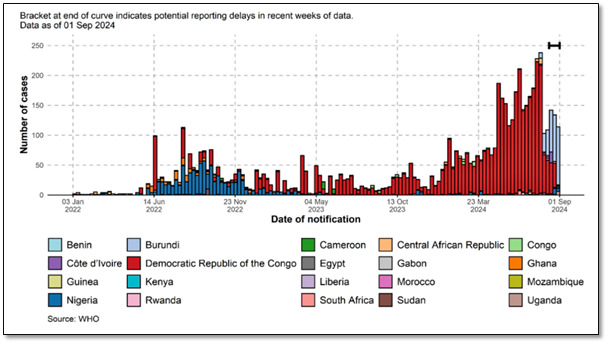
As per WHO, 121 countries have reported a total of 1,03,048 Mpox cases and 229 deaths globally between January 2022 - July 31, 2024. As of September 01, 2024, 15 African countries have reported 3,900 confirmed cases of the disease. The Democratic Republic of the Congo, Burundi, and Nigeria are the three countries with the highest number of cases this year.[1]
In India, 30 Mpox cases have been reported since the WHO's 2022 PHEIC declaration. Further, India is reportedly implementing preparatory measures and public health strategies to address potential Mpox cases.
All about Mpox: Signs, Symptoms and Prevention
Mpox, previously known as Monkeypox, is a zoonotic viral disease with symptoms similar to Smallpox, though less severe. It typically resolves on its own within 2-4 weeks.
Severe cases are more common in children and depend on factors such as virus exposure, patient health, and complications. It spreads through prolonged close contact with an infected person or direct contact with body fluids, lesion material, or contaminated items like clothing or linens.
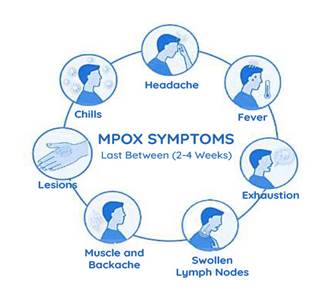
Mpox progresses through three stages: Incubation, Prodrome, and Rash.
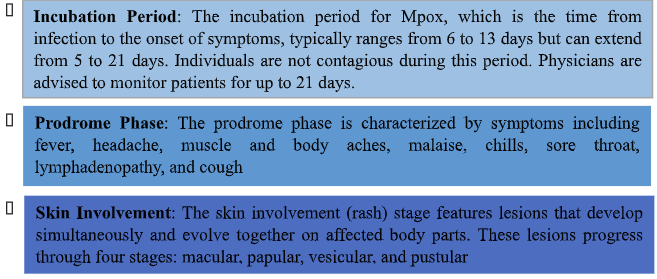
Prevention is primarily focused on raising awareness about risk factors and educating people on reducing exposure to the virus. Key preventive measures include:
- Avoid contact with materials (e.g., bedding, clothing) that have been in contact with infected individuals.
- Isolating infected patients from others.
- Practicing good hand hygiene, such as washing hands with soap and water or using alcohol-based hand sanitizers, especially after contact with infected animals or humans.
- Using appropriate personal protective equipment (PPE) when caring for patients.
- Properly containing and disposing of contaminated waste (e.g., dressings) under Biomedical Waste Management guidelines for infectious waste.
India’s Preventive Public Health Measures Against Mpox
Prime Minister Narendra Modi chaired a high-level meeting on August 18, 2024, to review India's preparedness for Mpox and related public health measures. During the meeting, it was noted that Mpox infections are generally self-limiting, lasting between 2 and 4 weeks, and patients usually recover through supportive medical care and management.
Several preparatory steps had already been taken in August 2024:
- On August 12, 2024, the National Centre for Disease Control (NCDC) held a meeting of experts to assess the Mpox risk for India.
- The NCDC revised its earlier Communicable Disease (CD) Alert on Mpox to incorporate recent updates.
- Health teams at international airports and ports of entry have been trained and informed about the current situation.
The Director General of Health Services (DGHS) also conducted a video conference with over 200 participants, including state-level health authorities and Integrated Disease Surveillance Programme (IDSP) units, to raise awareness about Mpox. The conference emphasized the need for enhanced surveillance and prompt case detection.
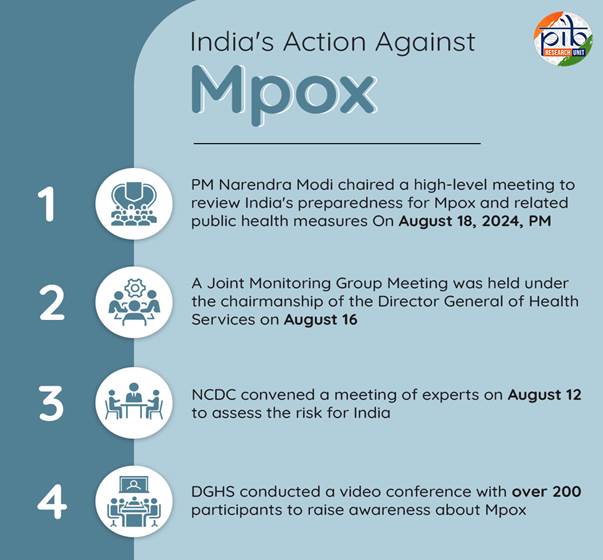
On August 16, 2024, a Joint Monitoring Group Meeting was held under the chairmanship of the Director General of Health Services.
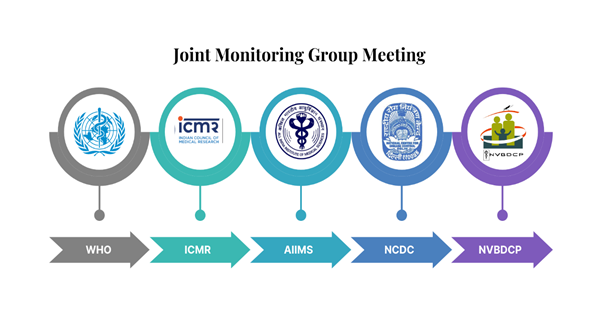
This meeting brought together experts from various relevant fields, including representatives from the NCDC, World Health Organization (WHO), Indian Council of Medical Research (ICMR), National Centre for Vector Borne Disease Control Programme (NVBDCP), Directorate General of Health Services, Central Government Hospitals, and All India Institute of Medical Sciences (AIIMS).
It was also directed that surveillance be strengthened and effective measures be implemented for the prompt detection of cases. Additionally, it was instructed that the network of testing laboratories be upgraded to ensure early diagnosis. Currently, 35 laboratories across the country are equipped to test suspected cases of Mpox.[2]
Furthermore, it was stressed during these meetings that protocols for prevention and treatment of Mpox should be widely disseminated. An awareness campaign targeting healthcare providers was also emphasized, focusing on the signs and symptoms of the disease and the importance of timely reporting to the surveillance system.
Conclusion
India has been taking proactive measures against Mpox. The country has implemented a comprehensive strategy involving expert consultations, enhanced surveillance, laboratory preparedness, and awareness campaigns. While remaining vigilant, Indian health authorities have assessed a low risk of a large-scale outbreak, demonstrating a balanced approach to public health management in the face of emerging infectious diseases.
References
Click here to see PDF.
******
Santosh Kumar/ Ritu Kataria/ Abhinandan Sharma
(Explainer ID: 152119)
आगंतुक पटल : 7844
Provide suggestions / comments